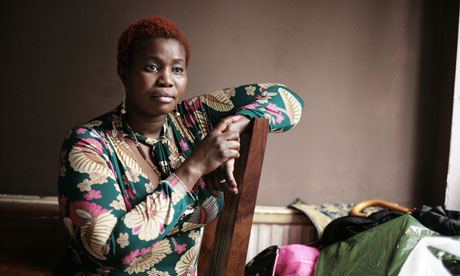
'They cut us to preserve the virginity. They cut us to stop us having sex before marriage. The main reason is to control your sexual urge. So many times, you will hear them say to girls and women, 'You've not been circumcised, this is why you'll sleep with anybody.'" Sarian, was 11 when she was circumcised, in Sierra Leone. She's now in her 30s, and lives in London. She has a son, four daughters and a wry, ruminative delivery. "At the end of the day, it didn't stop me from having sex before marriage," she adds. "It didn't stop me from having an unwanted pregnancy before I was 19. It is just very, very painful. It is the worst experience ever."
Sarian is one of the community champions who were part of phase one of an anti-female genital mutilation initiative. The results of that – which were pretty good, though with caveats, as we'll see – will be presented to parliament on Monday, in the report, Tackling FGM in the UK. Then phase two will begin.
FGM was made illegal in the UK since 1985, and taking a child out of the country to perform the operation in 2003. Joy Clarke, the lead specialist midwife for women affected by FGM at the Whittington in London, explains why we don't really know yet whether or not that's working. They know the awareness is going up – when her unit first opened in 2000, only four women went to it; last year, they had 107. This is a major achievement, considering what Sarian says about giving birth when your circumcision hasn't been dealt with: "I was in labour for nearly four days. Nobody talked to me about it. I believe they thought they would offend me. You could see them talking between themselves."
But nobody can say whether the same – or any – progress is being made on preventing the circumcisions. "We've got to wait until a child becomes an adult, and becomes pregnant, before we'll find out. So we've got to wait til 2019. Anecdotally, I know it's happening. But a child would have to be brave enough to come forward, and say, 'This person did this to me, I can show you what it looks like.' Until we get that, or find another means of gathering evidence, it is very difficult."
Clarke goes on to stress that teachers have to be vigilant, a task that sounds difficult, shading into impossible, when she describes it. "This is the time of year when it is likely to occur. Schools are closed, and children have a very long vacation. So we need, first of all, for teachers to know and recognise suspicious signs. For example, a child speaking of going on a long holiday for a special celebration. That's what they would say.
"When they come back, teachers need to recognise if FGM has taken place. The persona of the child would change, she would be less likely to be involved in physical activity at school. Perhaps she will spend a longer time in the toilet, because if the vaginal opening is small, it will take her longer. Or she may go to the toilet more often, because she has an infection."
One of the chilling details Sarian mentions is that, because it is a taboo – in its strict sense, that people believe by talking about it they will bring a curse on themselves – girls go into the ceremony excited. "When they get us ready, it's like a big party. There will be singing and dancing, people beating the drums. Every time they're doing a cutting, the singing gets louder so you can't hear the girls screaming. We were blindfolded. But trust me, at the time, I was dancing, because I was looking forward to it.
Imagine the transformation, from someone who was smiling and dancing and happy, to lying on the floor with this big woman sitting on me … I still didn't know what was going to happen to me, until I felt that sharp cut."
Originally, the anti-FGM campaign tried to get into schools, and schools weren't keen, because many felt that it stigmatised certain ethnic groups. FGM is practised in 28 out of 43 African countries; the majority of the women Clarke sees are Somalian, with type-three FGM (the most severe – it has to be reversed before you can have sex, though somehow, I don't really want to think about how, many women with type-three FGM don't have a reversal until they're already pregnant). Kurdish Iraqis are also likely to have been circumcised, though that would be type one or two.
It's culturally sensitive, sure – you wouldn't get very far with a campaign that behaved as though a girl with Scottish parents was as likely to be a victim as a girl with Somalian parents. But if cultural sensitivity is going to be used as a junk drawer, to toss things into when you can't find a place for them in mainstream debate, that's not good enough.
"If that child was born in this country," Joy enunciates carefully, "she is a British citizen, and regardless of where it took place, a crime has been committed against her."

